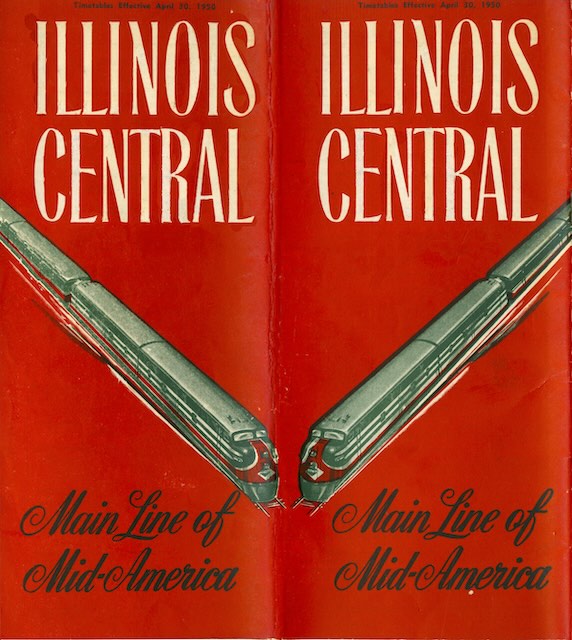“Test your vacation I.Q.” invites the front cover of this timetable (the cover shown below being the back cover). This test, however, was somewhat deceptive.
 Click image to download an 18.0-MB PDF of this 36-page timetable.
Click image to download an 18.0-MB PDF of this 36-page timetable.
“Is Florida too warm for summer vacations?” asks the I.Q. test. “No! Florida is no warmer in summer than the northern states.” What it is, however, is far more humid, making it less desirable for vacations than “the northern states.”
“Will Chicago have another fair?” asks the test. It turns out the answer was yes, but compared with the Century of Progress Exposition of 1933 or the Chicago Railroad Fairs of 1948 and 1949, the Chicago Fair of 1950 was about as exciting as a county fair. It was held on the site of the railroad fair and used some of the same structures and exhibits.
The fair did have a highly truncated “transportation on parade” that featured a few old steam locomotives, a new F7 in General Motors colors, and a Pennsylvania Railroad T1. These were supplemented by some bicycles, a few automobiles, and what looks like an F-84 or possibly an F-84F that was pushed and pulled across the stage by about 19 Air Force personnel.
The I.Q. test is accompanied by a Rand McNally map of the United States highlighting Illinois Central routes and its connections to Florida. However, this didn’t replace the traditional centerfold map of the railroad, which itself was supplemented by a map of South America on the page before the centerfold and an enlarged map of Florida, Alabama, and Georgia. Since the IC went as far as Birmingham, the map could show the routes of all the Florida connections from there.
Page two of this timetable includes a full-page, self-serving article touting railroads as “your fellow citizens.” Signed by IC vice president R.E. Barr, the article was probably really written by lobbyists at the Association of American Railroads. While it made some legitimate complaints about the unfairness of subsidies to competing modes of transportation while the rail lines were heavily taxed, it didn’t offer any data as evidence and was really just a propaganda piece that wouldn’t persuade and might even offend people who didn’t already believe it.
